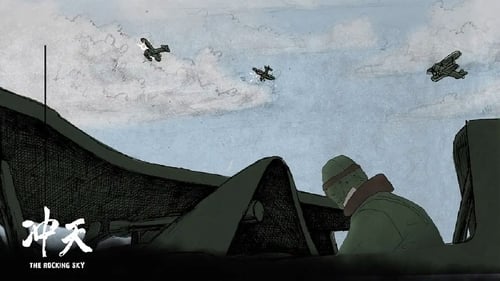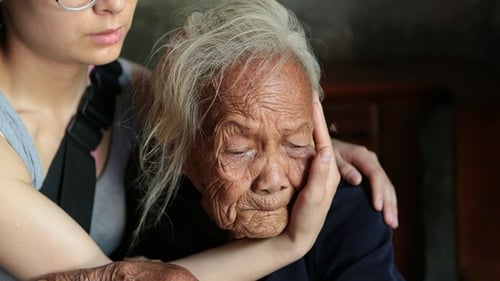长焦摄像师
Жанр :
Время выполнения : 11М
Директор : Yu Guo
Краткое содержание
The work was shot in Chongqing where Yu Guo lives. The artist utilises a camera with 8000mm digital zoom to capture the farthest objects that lens could reach. Because of the refraction of air and the limit of distance, the images that taken from kilometres away becomes blurred. Yu Guo continually adjusts the focal length in the process of shooting. Then, these unclear and ambiguous objects are inserted into the original or different video clips by re-editing or a collaging way. Through the misplacement of vision and the transformation of context, the original information and reference split in the images. Yu Guo attempts to interrogate the physical distance between himself and object, the relationship between subject and object in the video, and then re-examine the individual relationship and psychological distance in real life.

Old Jia gave up his city life and returned to the countryside with his wife. He abandoned chemical fertilizer to practice natural farming. His philosophy attracted a big group of admirers from the city, whereas local villagers disagreed on his approaches.

The "Great Sichuan Earthquake" took place at 14:28 on May 12, 2008. In the days after, ordinary people salvage destroyed pig farms in the mountains, collect cheap scrapped metals, or pillaging other victims' homes. Behind the media circus of official visits is an inconsolable grief of families searching for loved ones. As the Lunar New Year approaches, vagabonds and family tell of the ill-handling of rebuilding schemes and misuse relief funds. As they prepare for another visit from a high official, the refugees are swept out of the town and into tent cities. The promise to put a roof over their heads before winter seems impossible to keep.

Зима, городские деревни в Пекине. Дацин - дурак, Семья Дацина и трое молодых людей вместе живут во дворе. Дацин всегда чинит крышу, Лайшун любит оставаться на крыше и читать книги.

Some memories from a painter.

To commemorate the 70th anniversary of the victory of WWII, this documentary film describes the eight years of dauntless air-force fighting of the republic of China during the Anti-Japanese War, with only 300 combat-capable aircraft from China while Japan had over 2000.

Follow the lives of the elderly survivors who were forced into sex slavery as “Comfort Women” by the Japanese during World War II. At the time of filming, only 22 of these women were still alive to tell their story. Through their own personal histories and perspectives, they tell a tale that should never be forgotten to generations unaware of the brutalization that occurred.

Китайская семейная сага, рассказанная в разные периоды времени, начиная с открытия женой гомосексуальности мужа. Когда ее взрослая дочь приходит в гости, другие семейные секреты постепенно раскрываются...

A soon-to-be first-time voter, the filmmaker’s thought-provoking journey into the Rust Belt and South captures four Asian American voters’ ardent first time grassroots political participation ignited by the 2016 rise of “Chinese Americans for Trump.” FIRST VOTE is a character driven cinema verité style film chronicling the democratic participation of four Asian American voters from 2016 through the 2018 midterm elections.

July 27th, 1976 - a day the people of Tangshan will never forget. When that fateful day ended, tens of thousands had been killed, and the lives of the survivors would be changed forever. No public official, no expert, nor anyone among the seismological personnel - regardless of what they were doing that day - should ever forget. History will always remember the twilight of that day.

One long tracking shot through a park in Chengdu.

In 1946, Heidi is entrusted to a Swiss family by her father. He will never come back for her. Today, François Yang questions his mother about her past. What follows is a journey to China, a quest to reconstruct memory. Through contact with her brothers and sister, Heidi measures the extent of the drama experienced by her family that remained in China, persecuted by the Communist Party.

China marks the beginning of the extensive Asian theme in Ottinger’s filmography and is her first travelogue. Her observant eye is interested in anything from Sichuan opera and the Beijing Film Studio to the production of candy and sounds of bicycle bells.

Xuan is a young man working in the film industry in Beijing. To make a documentary film that he wants to present at international festivals, he decides to take advantage of the holidays of the Day of the Dead to return to Chengdu, his hometown located at the other end of the country. The documentary he is about to make is about his relationship with his own lover. He leaves for Chengdu, accompanied by another man, Bo, the cameraman of the film. The two men take the train to Chengdu where Hong, Xuan's lover, is waiting for them. From the first moment of their arrival at the station, Xuan and Bo begin to turn with their camera, Xuan having already explained to Bo what he wanted to film and that Hong would always be "playing", Bo then trusting in Xuan. But Hong is more and more opposed to this camera and the presence of Bo.

It has been a month Chang's wife Ling Yue has been missing. With no reasons one fine day she went to work as usual and then never returns. No one knows where she went or what had happened to her. Chang could not figure out why she disappears out of the sudden. She left no message of whatever kind or clues. One day a man named Tong shows up and claims to be Ling Yues lover. Apparently Tong is looking for Ling Yue too. In a turn of event both men formed an uneasy alliance in order to find Ling Yue

A documentary film showing the life of Niu Hongmiao, a 20-year-old country girl who is now a prostitute in Beijing. Around the time of wheat harvesting, she goes back home to Dingxing County, Hebei Province to visit her parents.

The movie follows two unfortunate secret lovers who are constantly looking for a solution to their situation. Both of them are always arguing over their relationship. One day they went to a trip out of the city, into the outskirt. They hope they can solve their problems or at least escape them temporarily. They don’t have a solution, and they don’t understand why they are together. One thing that keeps them together is their love and care for each other. This is the second part of James Lee’s Love Trilogy which takes another look at unfaithfulness or rather faithlessness.

A highway is waiting to go through a quiet village in Hunan, a province in central China where Mao was from. Due to the high cost of construction, construction companies and migrant workers who live on road work rush to here like the tide. In the following four years, they root in this strange place for interests, paying sweat and blood, even their lives. With their arrival, local village and peasants are forced to change their lives. Many hidden interest lines and hidden rules about road construction of the nation are unveiled, together with the shocking truth and emerging secrets.

The film is about a woman from a rural area and works in a small restaurant as a cleaner with very low pay. As she has to support her family (mother and daughter), she has no money for herself for better makeup or dress up. She has low esteem. She later was fired by the boss. Because of no money and no home, she goes to the massage parlor and works there a sex worker. It happens that the first customer is the chef of previous restaurant. She has admired him for a while. In this first sex exchange, she is well satisfied both emotionally as well as economically. She starts sex work this way and becomes more confident.










